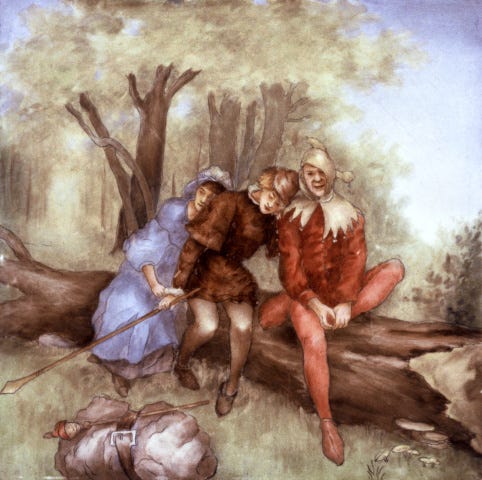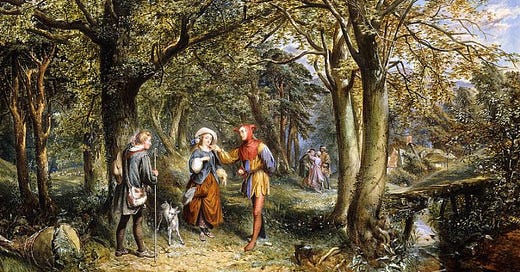The invisible backdrop of Shakespeare’s plays: part two
Nobody was bowling alone in the forest of Arden
This is part two of two. It makes sense on its own, but will make more sense if you read part one here.
Something that I love about Shakespeare’s comedies is that he often develops some sort of complicated conceit by which everyone is obliged to hang out all the time. Sometimes, as in Much Ado About Nothing, where everyone is part of an idyllic Italian community, this seems to be just the daily life of the characters. But in two of his classic comedies, As You Like It and A Midsummer Night’s Dream, everyone is just hanging out in a forest for various reasons, coming across one another in the forest, meeting the denizens of the forest. In The Tempest (not exactly a comedy but a great example of this trope), everyone is literally shipwrecked on an island. Shipwreck also gets the love interests of Twelfth Night to the seemingly secluded Illyria.
Though, as every English teacher loves to point out, Shakespeare’s comedies aren’t called comedies because they are funny (they are funny!), the hanging-out conceit is present in a lot of our own age’s best sitcoms. Seinfeld takes place mostly on the soundstage that is Jerry’s apartment. New Girl: an apartment where Jess is the new girl. Scrubs: a hospital. The Office: an office. It’s almost too on-the-nose to mention that there are popular sitcoms called Community and Friends.
“Everyone is hanging out” is the perfect opportunity for comedy. It predisposes audiences to be ready for something funny (or romantic, or both!) to happen. That’s because a community where everyone knows each other is one where the audience is quickly drawn into an existing rapport: we know these characters know one another, know how far they can push a joke without hurting someone’s feelings, can anticipate who will do what. It is a comfortable setting.
It’s also, very importantly, not a setting in which everyone likes each other. All the villains of the major comedies I mentioned are also in the forest, or on the island, or in the small town. Same goes for the sitcoms. If you want to enjoy jokes from Rosalind or Jim, you have to tolerate Jacques or Dwight wandering around killing the vibe.
This is what I was getting at last week when I said community isn’t really meant to be an individual project or a group project. When we think about building community, we usually think about inviting people we already like to our house. Going out for coffee with that work friend who could be a “real friend.” Finally repaying our dinner debt to that couple who invited us over in 2012. Joining a book club.
In other words, when we think about community, we think about building connections with people we already like. Sociologists would call these “affinity groups.” Far be it from me to say that affinity groups are worthless—I like getting together with people I like, obviously.
But I think what Shakespeare points out by throwing everybody together in the course of his comedies is that it’s most important to hang out with the people that are there. And even for Shakespeare, having people just hanging out did require some sort of conceit. They were shipwrecked, or exiled, or very, very lost.

The thing about modern life is that no matter how many book groups you are in or dinner parties you host, the background of your life is still something different—something individual and solipsistic—a background that breaks through like an inopportune glimpse of a green screen when the people in the group inevitably start to get on one another’s nerves. You don’t have fun at dinner with your gentle parenting friends, so you don’t invite them back. The book group gets boring, so you stop reading and then stop coming. Affinity groups cannot be the background of your life, the fabric without which you can’t understand anything at all. (When we try to make them that, they almost inevitably seem to become coercive cult environments—a topic for another day.)
I’m usually skeptical of narratives of decline, but one narrative of decline I buy wholeheartedly is what’s outlined in Robert Putnam’s Bowling Alone, published in 2000. In a book chock-full of alarming statistics, he describes an America where civil society is losing its interconnectedness, where people are increasingly—you guessed it—bowling alone instead of bowling in bowling leagues.
It used to be the case that people frequently got together with a third purpose in mind: bowling or sewing or organizing the church flowers. If you are getting together to organize the church flowers, you need to set aside for a moment the fact that Linda from the 9:30 service is a bumbling idiot. You have flowers to organize. In a way, you and Linda and Doris and Martha are stuck in your own personal forest of Arden. You’re thrown together, not because you enjoy one another’s presence, but because you have something else to do. And you continue to see one another over and over, until you and Linda form an alliance when Doris has that ridiculous fit about the narcissi, and before you know it Martha’s son is in love with your daughter, and you’re all in your own Shakespearean comedy.

The world that Putnam describes is a world in which interconnected groups like this formed the fabric of American life. And Putnam published Bowling Alone in 2000—before the invention of Facebook or the iPhone. In other words, we, as Americans, lost the feeling of being together before we started to be drawn in by the wiles of social media. Yes, it’s not helping, in most cases. But it’s a tiny, failed bandage on a deep wound: the desire to be part of our own comedies.
The only time in the last year I’ve seen my screen time go down dramatically is when I picked up crocheting. At first, I was crocheting by myself. Then I joined a crafting group, which I learned about on Facebook. Now I sit down every Wednesday evening with six or seven women about my age and crochet steadily in the corner of a bar for two hours.
Most people bring knitting or crochet, though I’ve also seen girls zine making, paper quilling, and playing Stardew Valley on a Switch. Sometimes we talk—sometimes we don’t. We hear a lot about the love life of someone’s coworker named Scott. In fact, we joke that Scott, constantly unlucky in love, is an honorary member of the group. We laugh a lot about Scott. We laugh a lot generally, especially for a group of girls who barely know one another’s names. We don’t have much in common. If I spent time with most of them one on one, we’d probably drive each other crazy. I look forward to it all week long.
Of course, my crafting group isn’t singlehandedly restoring my sense of a deeply woven underlying fabric of American society. But I think it’s helping, and it’s helping more than a lot of things that I’ve attempted with a lot more self-awareness about trying to “make friends.” The weird little bar that lets seven girls crochet on a Wednesday night is the setting of our own comedy. And I think if Americans spent more time in board game clubs or walking groups or craft circles, we wouldn’t spend so much time on those dang phones.






This is a charming way to look at things--and a good reminder that at some level, we need those who annoy us or confound us or puzzle us just as much as we need people that we find perfectly congenial. (Which is half the appeal of social media, anyway, look what happens when everyone silos off into what they think are their predestined groups!)